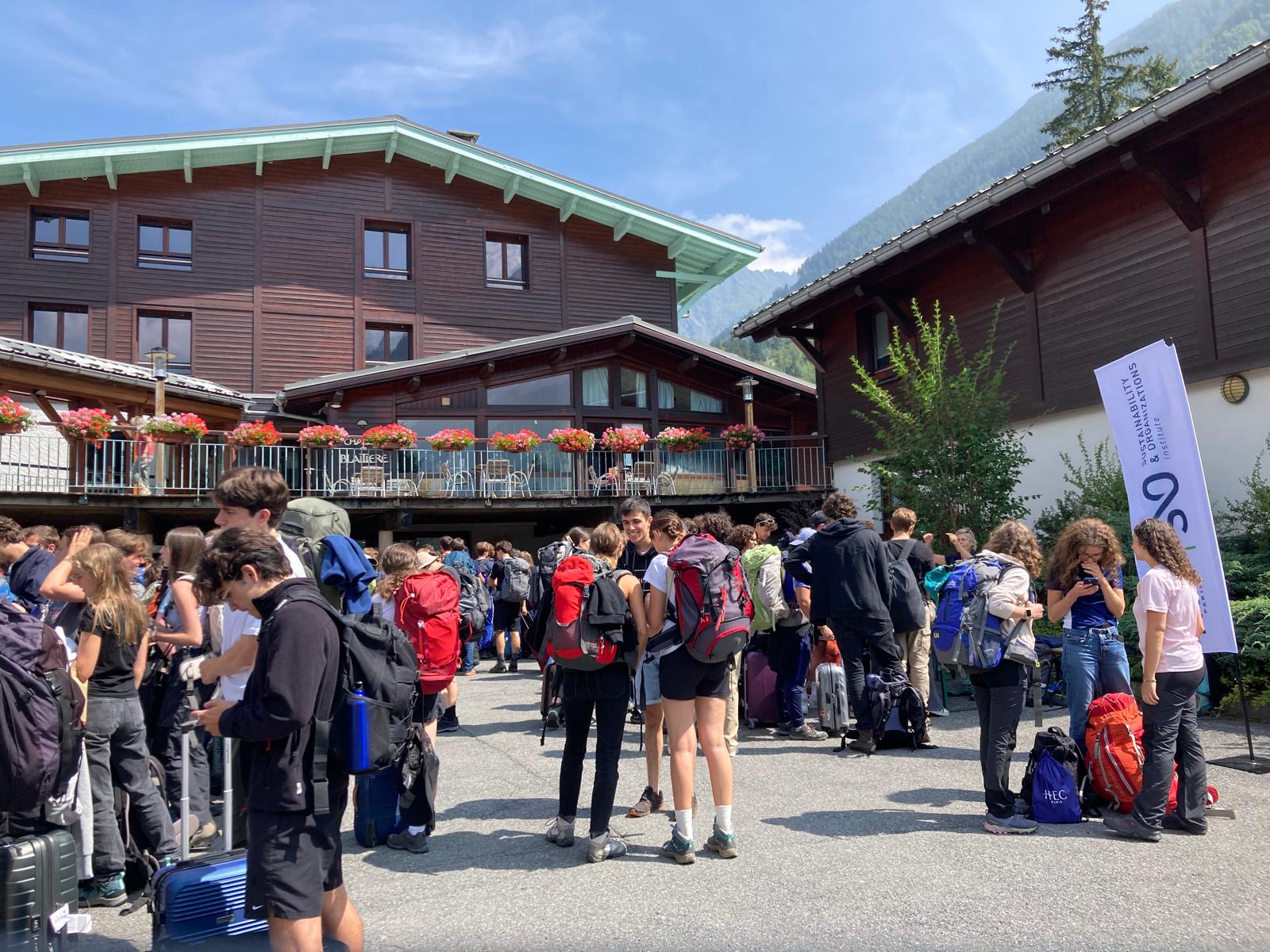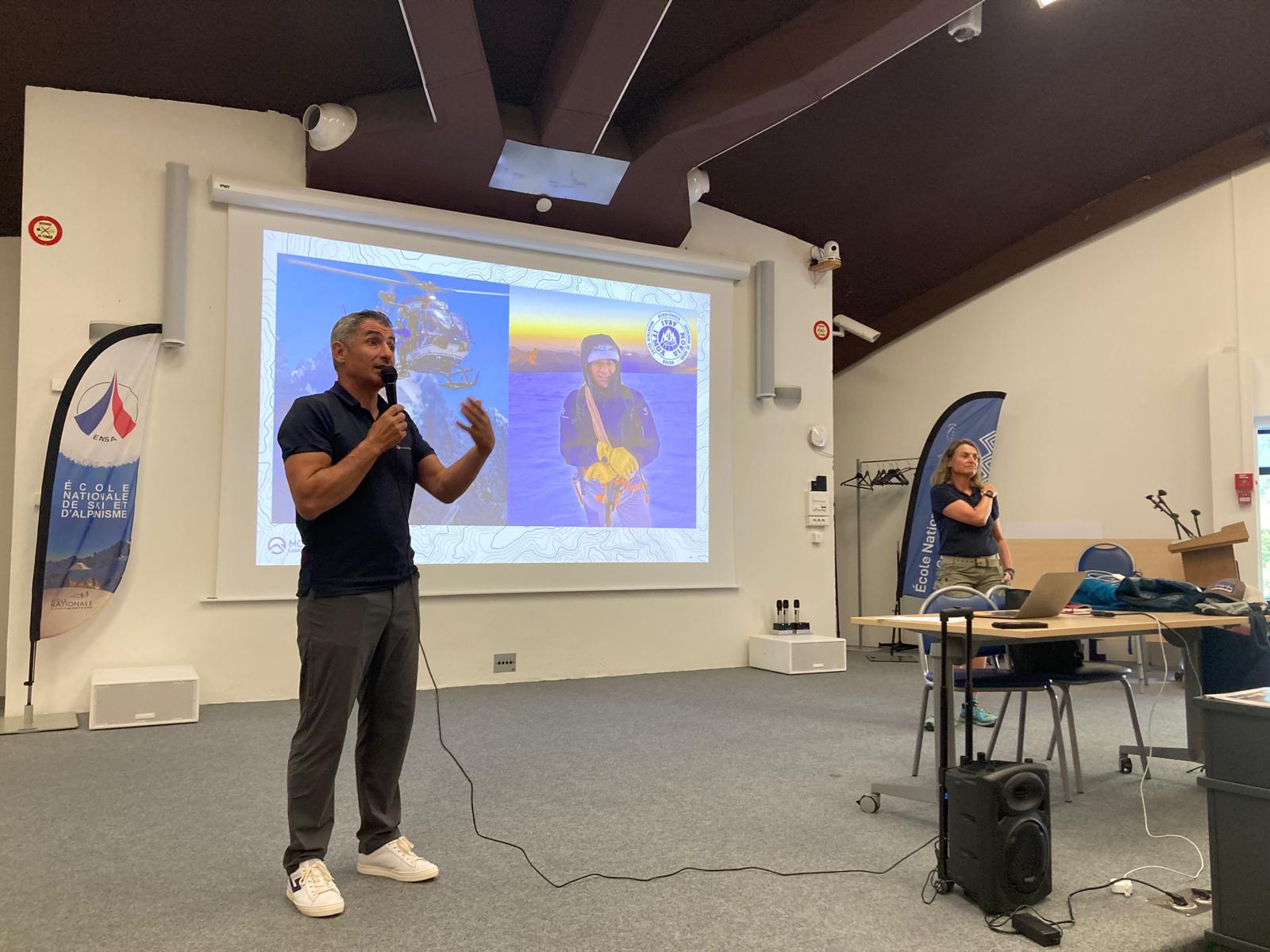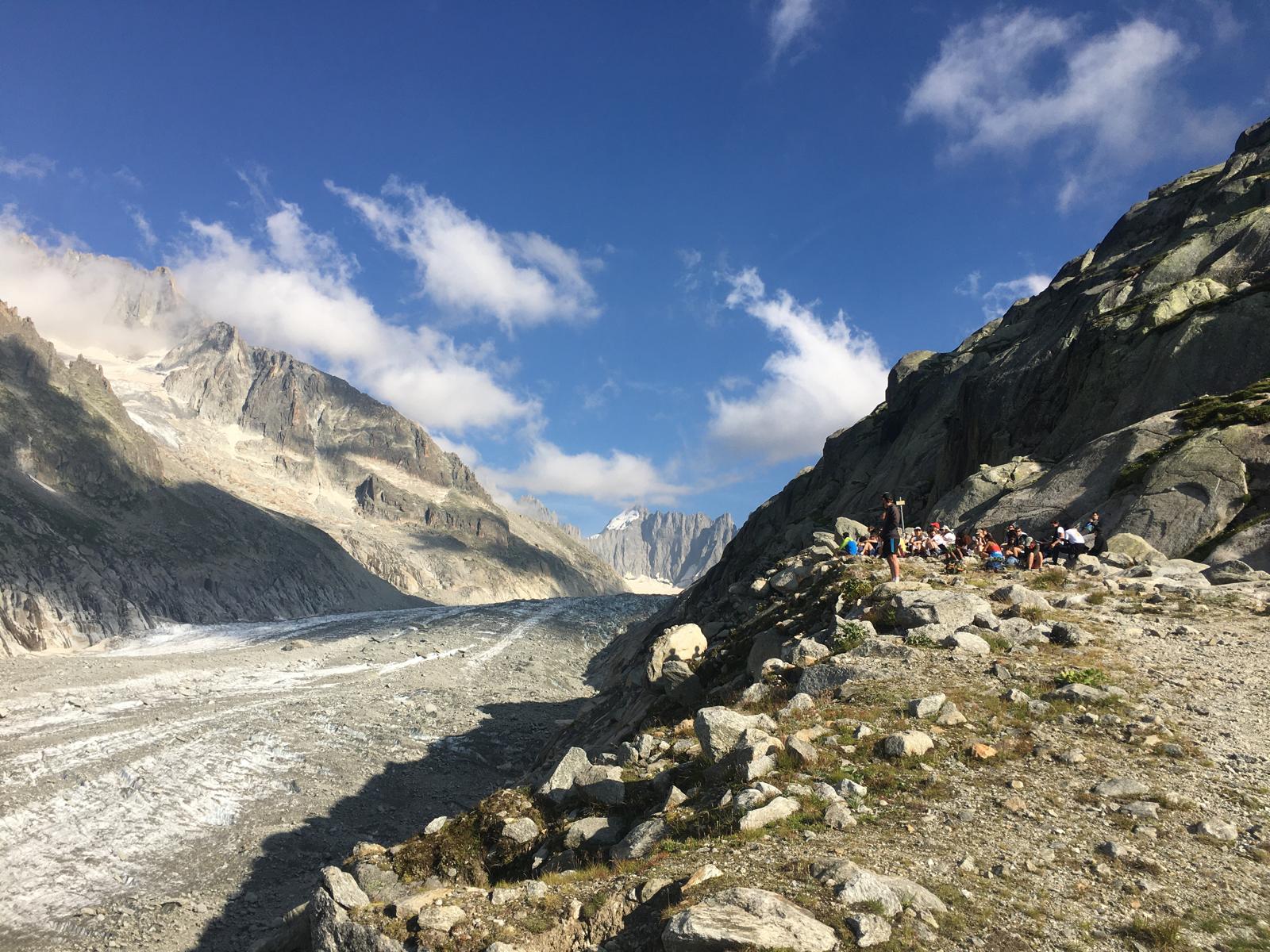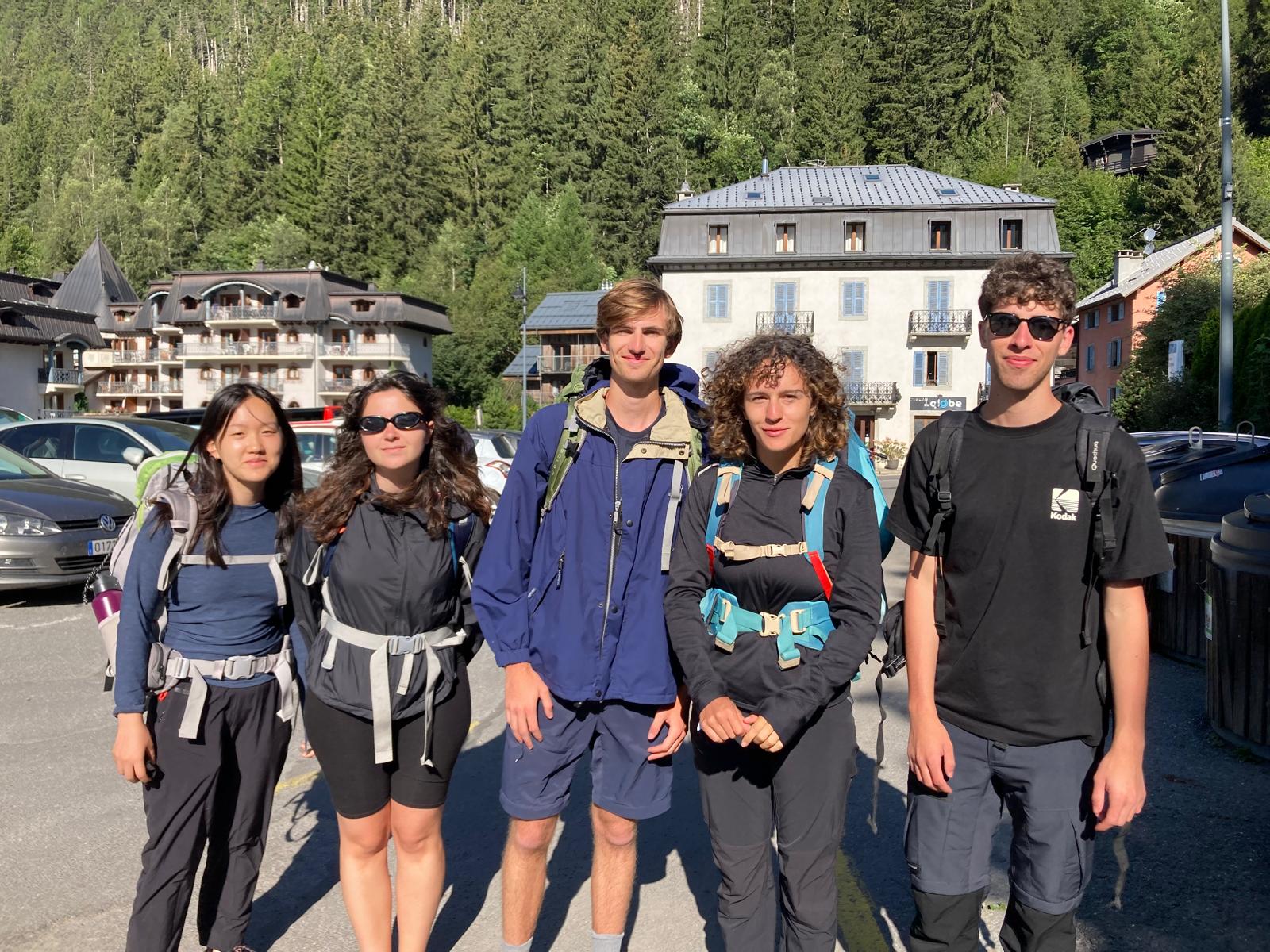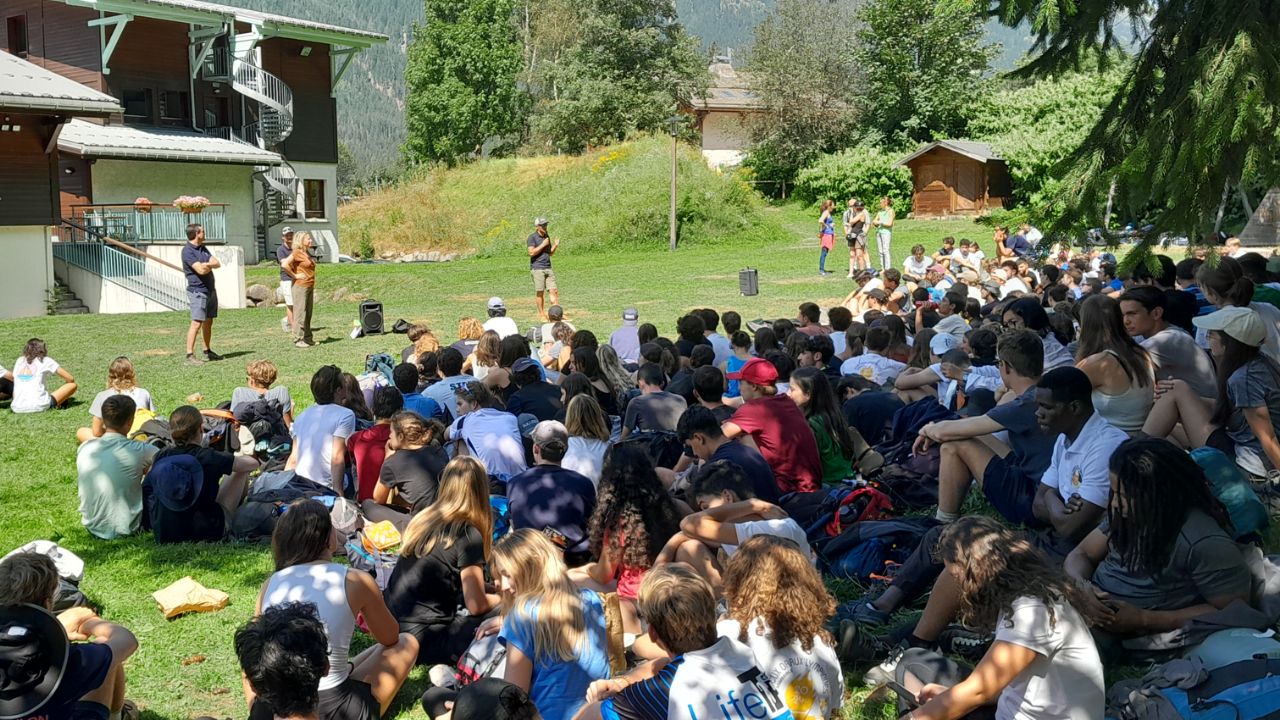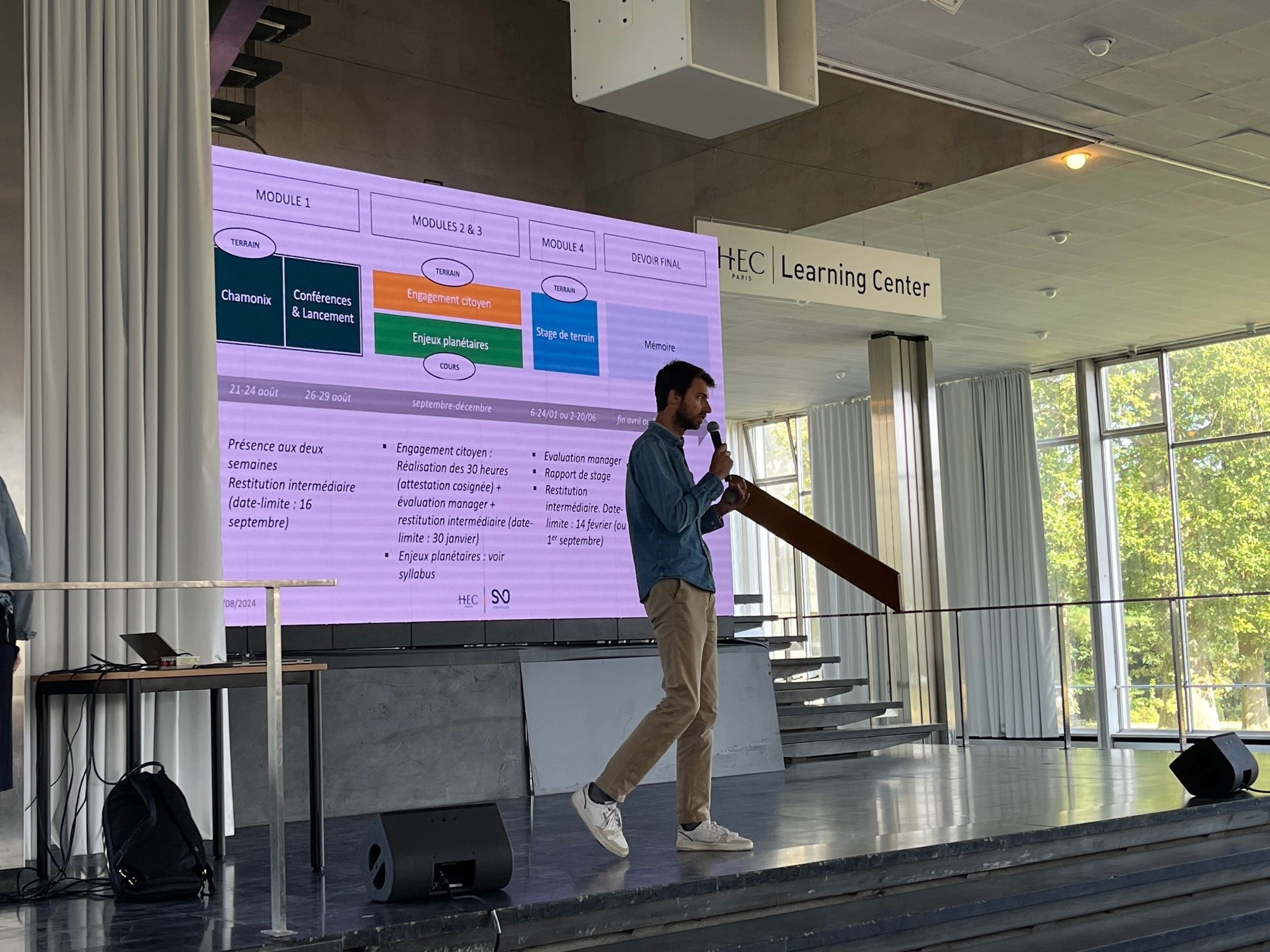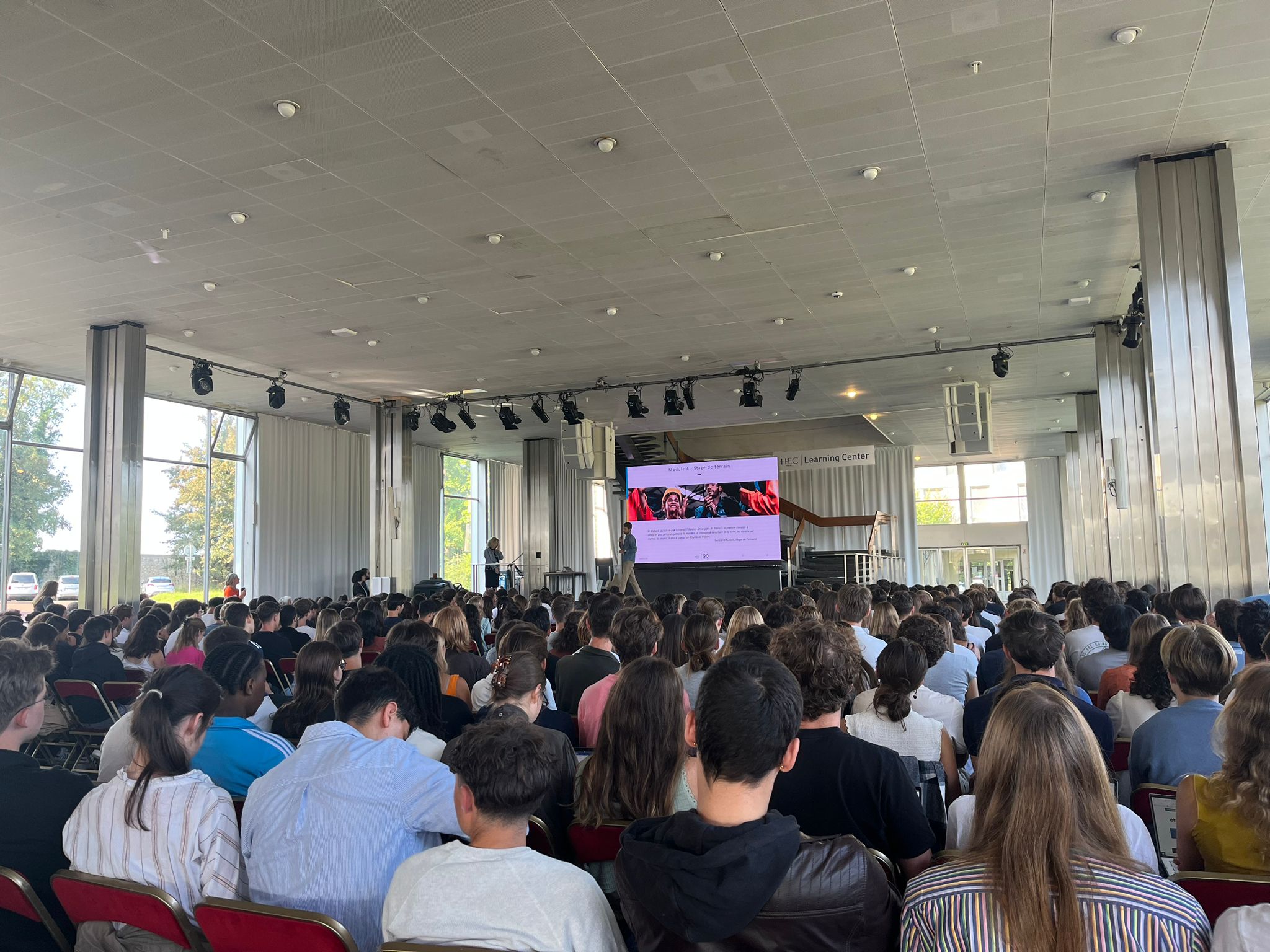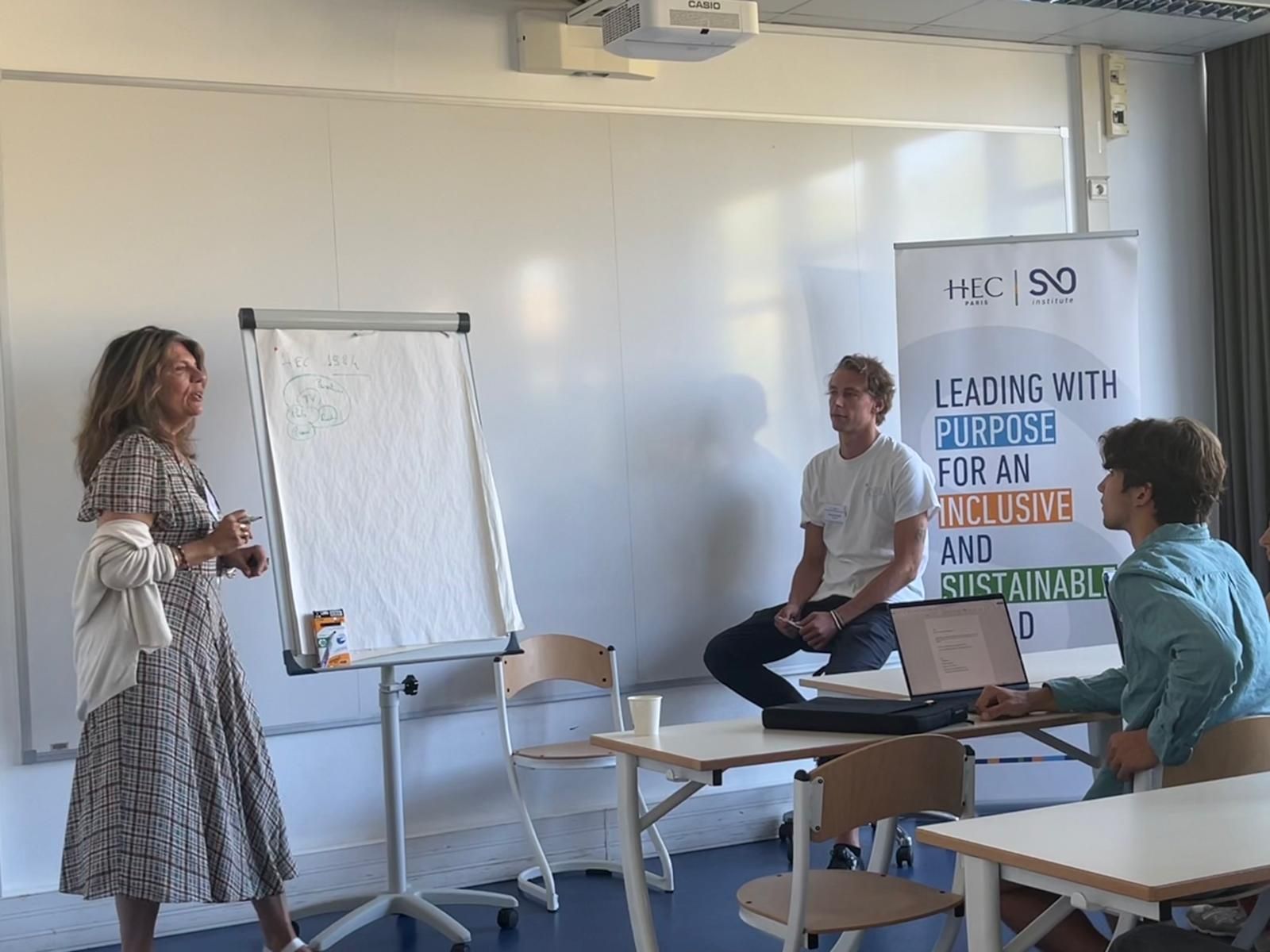Tomorrow’s Sustainability Leaders Meet at the Summit
Tomorrow’s Sustainability Leaders Meet at the SummitFor the fifth time in as many years, new HEC Paris students began their undergraduate (L3) studies in the French Alps of Chamonix. Between August 21-24, 375 students from across France, as well as from Côte d’Ivoire and Morocco, gathered in Europe’s most extensive mountain range to explore their personal paths and reflect on the consequences of the contemporary socio-economic model of capitalism. Highlights from this giant step from preparatory school to the prestigious business school.
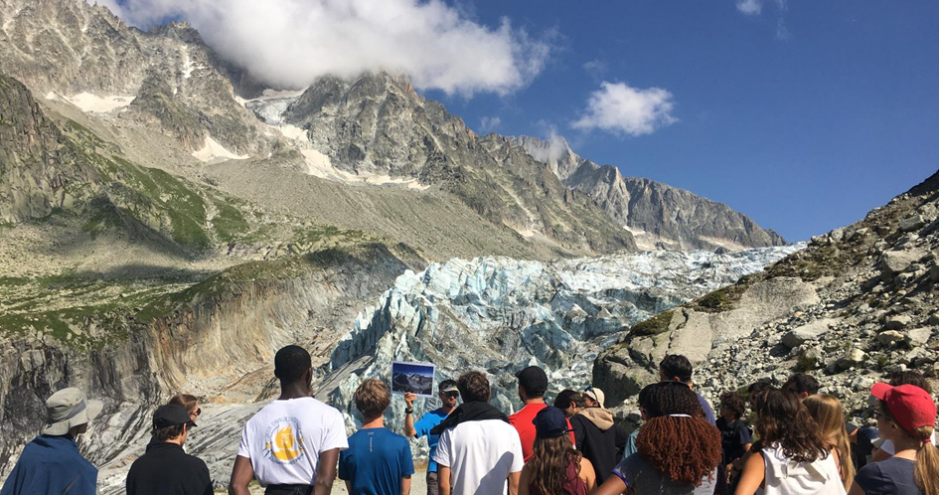
Un groupe d'étudiants face au scientifique Ludovic Ravanel et au glacier de l'Argentière, Alpes françaises (Photo : Céline Bonnet-Laquitaine)
Interdisciplinary Approach to Seminar
In 2019, HEC launched the "Purpose and Sustainability" seminar, which was made possible by donations from the "Joly Family Endowed Chair in Purposeful Leadership." HEC alumnus-turned-successful-business-leader Hubert Joly was approached by Rodolphe Durand and Cécile de Lisle, founder and executive director of the Sustainability & Organizations (S&O) Institute at HEC Paris, with a ground-forging proposal: integrating new students into the business school by rethinking management and purpose in their future careers in natural settings.
The seminar, now a core part of the Grande École, has been refined over the years to become a key experience in students' search for meaning. For the past three years, it has been organized by Romain Briat, executive director of the S&O Purpose Center, Anne-Prelle Delhumeau, program manager, and the team of coaches and consultants from Blaise Agresti’s Mountain Path company. The three-day gathering blends hikes and survival exercises with talks led by guides, scientists, athletes, and CSR experts, all aimed at inspiring students as they embark on their HEC Paris journey.
This mountain retreat encourages students to step back, get to know themselves better, and align their actions with their raison d’être —despite the conflicting demands of society and the workforce. Equipped with backpacks, they shared experiences in hiking, first aid, mountain climbing, and a night in a mountain refuge.
Find the filmed report (with interviews in French):
A Breath of Fresh Air After Two Years of Hard Work
Few students knew that HEC's school year started in natural settings, but all those interviewed shared their pleasure in meeting each other in this way. Anaël Thimon confides: “I was apprehensive about socializing with nearly 400 students and getting up early, but I was pleasantly surprised by the breakdown into small groups and the beautiful scenery.” "Each group consisted of 15 students from different preparatory schools, fostering diverse encounters," adds Anne-Prelle Delhumeau.
Those who pass the entrance exam come from the preparatory school consisting of intensive economic and commercial, general, technological, but also literature streams. They joined one of Europe’s best business schools, often a sure ticket to professional success. Many are unsure of the exact career path they will pursue, however, and some barely know the world of management. Stéphane Diakité from Côte d’Ivoire explained: “In preparatory school, we had to absorb a lot of knowledge, but now we can think about how to align our interests with a career that has meaning for society.” For now, Stéphane wants to explore finance, as “it governs everything I’m interested in, including cinema.”
"Be Ambitious but Authentic"
At the foot of the mountains, Eloïc Peyrache, Dean of HEC Paris, set the tone for the seminar in his opening speech. He encouraged students to broaden their horizons, find their uniqueness, and give meaning to their professional engagement. He emphasized the opportunities HEC offers—its faculty, researchers, coaches, alumni, geographic reach—to find solutions aligned with their interests amid the prevailing eco-anxiety and global conflicts. "At HEC, we identify problems in society, but we also focus on solutions and action... Be the entrepreneur of your life." Find his interview in French on LinkedIn.
He also warned them of potential biases: "Success in the entrance exam has given you great confidence in yourself and your abilities... sometimes too much. This is a real strength and an important key to happiness. But you should also ask yourself, what will you do with this confidence? Who do you want to become, and what impact do you want to have?"
In the course of the activities, two students expressed a newfound confidence, fueled by their own achievements. Aurélia Miessan confided: “It was my first hiking. It was tough, but accomplishing it gave me confidence.” Claire Mazataud, who overcame her fear of climbing thanks to a mountain guide, added, “Eventually, I loved it!”
Finding Your Ikigai: A High-Level Athlete's Perspective
Mountain Path invited top performers, mountaineers Hilary Gerardi and Charles Dubouloz, to share their respective quests for purpose. Hilary Gerardi began by saying: "Making connections between sports and business is useful, but I’m more interested in the sustainability and purpose of both fields." She finds inspiration from Simon Sinek's theory of Why, the Japanese Ikigai method, and the acronym for "SMART goals." She collaborates with scientists like glaciologist Heidi Sevestre and B Corp brands, and leads the Run the Alps' CSR service, encouraging sustainable tourism and sports practices in the Chamonix valley and beyond. She even turns down invitations to compete in races that are far from France. Student Basile Rambach found Gerardi’s trajectory and dynamic personality inspiring, helping him "clarify his goals without wasting time."
The Glaciers Are Melting—So What?
A visit to a glacier capped each hike. Facing the Mer de Glace or the Argentière Glacier, France’s largest glaciers, geomorphologists and glaciologists explained how glaciers form and rapidly melt. “Here in the mountains, we are at the forefront of climate change, which is two to three times faster than elsewhere,” explained Ludovic Ravanel from CNRS and the Edytem laboratory.
This disappearance, driven by greenhouse gas emissions and human activity, has negative consequences for water and electricity supplies, agriculture, biodiversity, and industries. Confronted with this tangible evidence of melting, Ravanel invited students to reflect on their future responsibilities and how to balance ecology and economy in their careers.
Meeting the Valley’s Stakeholders
To understand the impact of tourism on the environment and local life, students posed as journalists, interviewing residents of the Chamonix valley. One group interviewed a library employee, a sportswear shopkeeper, and a mountain guide, who shared their observations about daily life. These apprentice journalists gained insights into the tensions between tourism’s economic benefits, its effects on the climate, and the rise in housing costs. These discussions triggered thoughts on topics like rebuilding a cable car despite its environmental impact and meeting a climate-skeptic mountain guide whose vision contrasted with the scientific data shared the previous day.
Milestone of the "Parcours Engagement"—What's Next?
During the seminar’s closing session in Chamonix, HEC sent its top-level representatives to highlight the seminar's importance. Julie Thinès, director of pre-experience programs, encouraged the students, exhausted but motivated, to quickly choose from a range of custom-made programs in France and abroad. Jean-Amiel Jourdan, director of HEC Talents, advised them to embrace the non-linearity of their paths: "Nearly one-third of current job tasks may become obsolete within the next six years due to automation and AI [source: McKinsey Global Institute, 2023 report], so think about how you will cultivate the skills and adaptability needed not just to remain relevant, but to lead in your chosen field".
The Chamonix seminar is just the start of an ambitious degree program spanning the three years of the Grande École curriculum, from L3 to M2. It kicks off the "Parcours Engagement," which continues the following week and is present throughout the academic year. It features conferences by engaged leaders like Christopher Guérin and scientists like François Gemenne, a co-author of the IPCC and a professor at HEC Paris. The students will complete 30 hours of volunteer work, a three-week internship, and a program on “planetary boundaries”, culminating in a final thesis. After completing their undergraduate studies, they will choose from a wide array of master's programs, from creative industries management to artificial intelligence management.
The ongoing curriculum overhaul aligns with the spirit of this program, with more than 20% of the courses (those of the Grande École) focused on ESG issues.
For 20-year-old students, HEC’s business school goals are clear: "HEC wants to transform its students," claim Ghali Bensouda and Louise Suchet. Ghali elaborates: "HEC aims to train more responsible leaders in light of environmental and societal challenges. And it’s understandable, given the depletion of natural resources and social inequalities." Louise adds: "I think companies will be more driven by regulations than by awareness... because companies don't self-regulate." Following the geomorphologist's talk on the links between ecology and the economy, student Alice du Gardin argued: "I think the idea of degrowth is frightening, whereas there might be another way to approach ecology, for example, other than just by no longer eating beef"…
What kind of leaders will future HEC graduates become?
Learn more:
In the special Knowledge@HEC review, "Aligning Business with Planetary Boundaries", find interviews of actors of HEC's community - students, graduates, professors, entrepreneurs and donors – on their vision of more sustainable future.
The back-to-school in Chamonix 2024 in the press in "Dauphiné Libéré", by Antoine Chandellier and in "Planète des Grandes Ecoles", by student Alice du Gardin.
And on LinkedIn: posts on Chamonix seminar and on the first week on campus.
Archives :
